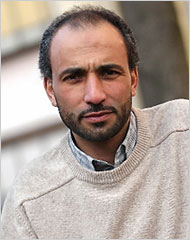 Over at Time Out Chicago, the website has conducted a short interview with Tariq Ramadan, the influential Swiss public intellectual who has been a both criticized and praised for his work on Islamic theology. In advance of his latest book, Islam and the Arab Awakening, Ramadan shares a few of his thoughts:
Over at Time Out Chicago, the website has conducted a short interview with Tariq Ramadan, the influential Swiss public intellectual who has been a both criticized and praised for his work on Islamic theology. In advance of his latest book, Islam and the Arab Awakening, Ramadan shares a few of his thoughts:
In Islam and the Arab Awakening, you refer to the “oft-repeated idea” of “the need to separate the political and religious spheres, as if this were the crucial question in Arab society.” Is that not crucial in any society?
In the Islamic tradition, they are separated. Yes, there are two different authorities, the religious authority and the state authority. To distinguish between authorities is critical; to divorce the ethical reference from political activities, I think, is wrong.Are ethics necessarily religious?
No, it’s one of the dimensions. We have people who are Christians and Jews and not religious at all. They have an ethics. But to say the only way to get a democratic society is to avoid any religious reference is unrealistic in a Muslim-majority society.You argue that, whereas in the West the separation of church and state enabled tolerance and pluralism, in Muslim societies secularism meant colonialism and repression.
Exactly. Secularization in the West helped diversity, tolerance. In Muslim-majority countries, secularism was the slogan coming from people who were in fact dictators. So the historical experience gave the impression to Muslims that secularism was not our democracy but mainly against Islam.
Read the full interview here. Read an earlier interview with Ramadan, with Editor at large David Kyuman Kim, here.












